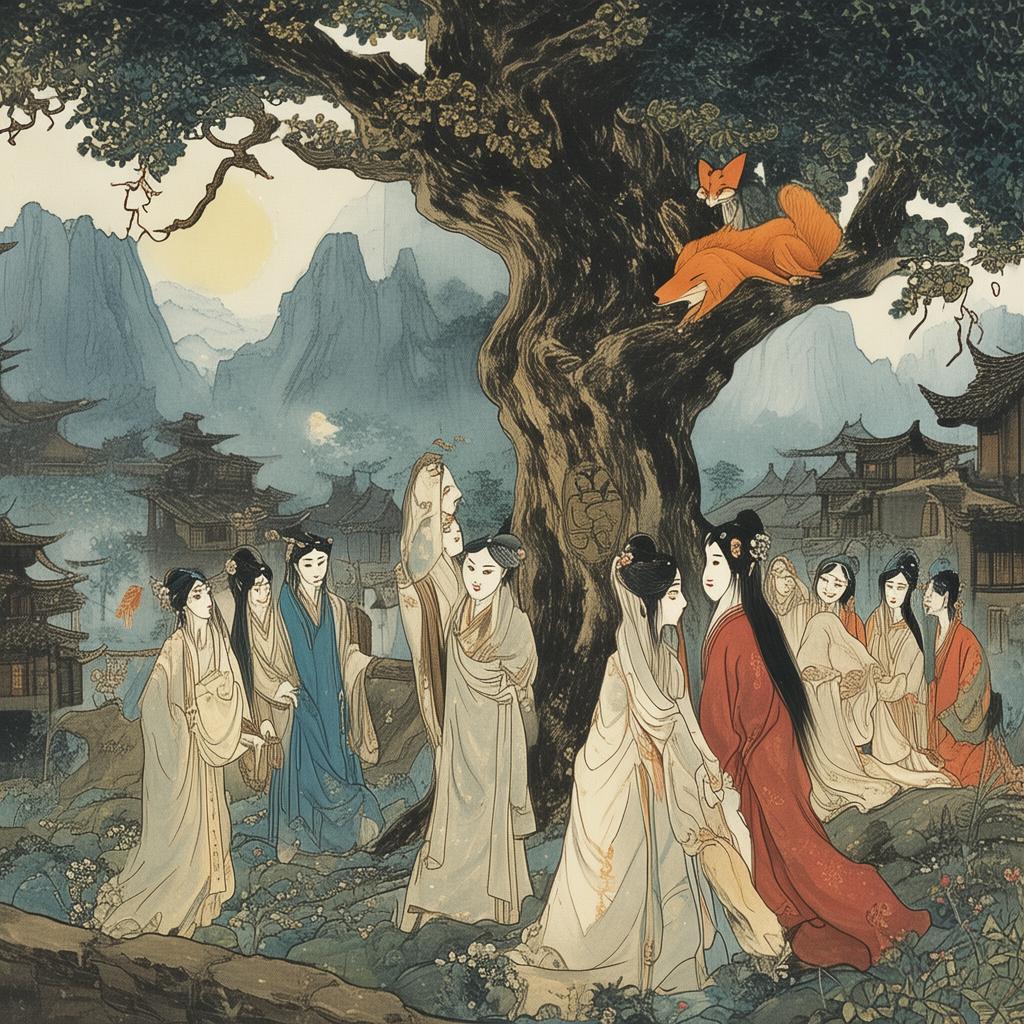The Ballad of the Chrono-Weaver
In the quaint village of Eldergrove, nestled between rolling hills and whispering forests, there lived a young musician named Eamon. His fingers danced across the strings of his lute with a grace that seemed to echo the very essence of the world around him. Eamon's music was a blend of the ancient and the modern, a harmonious fusion that captivated all who heard it. Yet, there was something deeply unsettling about his melodies; they carried a sense of foreboding, as if the notes themselves were whispering secrets of a hidden past.
One crisp autumn evening, as the leaves danced in the wind, Eamon stumbled upon an old, tattered book hidden beneath a loose floorboard in his grandmother's attic. The book was a collection of ballads, each bound with a leather strap and inscribed with intricate runes. His curiosity piqued, he opened the book to find a single ballad that stood out from the rest, its title glowing faintly in the dim light of the attic.
"The Ballad of the Chrono-Weaver," it read, and as Eamon's eyes traced the words, he felt a strange pull, as if the ballad itself was reaching out to him.
The ballad spoke of a time when the world was divided by the threads of time, and a single weaver held the power to weave and unravel the fabric of time itself. This weaver, known as the Chrono-Weaver, had the ability to travel through time, witnessing the past and the future, and even altering the course of events. But the Chrono-Weaver was not a hero; he was a man of great power and great loneliness, bound to his destiny by the very threads he wove.
As Eamon read the ballad, he felt a strange sensation, as if the words were not just ink on paper but a living force. He closed the book and placed it carefully on the shelf, but the sensation remained, a persistent hum in the back of his mind.
One night, as Eamon played his lute under the moonlight, the ballad's melody began to weave itself into his music. He felt a strange pull, as if the strings of his lute were responding to the call of the ballad. Without warning, he found himself transported to a different time and place.
He opened his eyes to find himself standing in a bustling marketplace, the air thick with the scent of spices and the sound of merchants haggling. The year was 1292, and Eamon was no longer the young musician from Eldergrove; he was a young man named Alistair, a member of the Chroniclers, a group of scholars who studied the mysteries of time.
Alistair's mission was to find the Chrono-Weaver and learn the secrets of time travel. But as he ventured deeper into the past, he discovered that the Chrono-Weaver was not a single person but a title passed down through generations. Each Chrono-Weaver was chosen by fate, bound to their destiny from birth.

Alistair met a woman named Elara, a Chronicler's apprentice with a mind as sharp as her sword. She was the one who had been chosen to be the next Chrono-Weaver. As they worked together to uncover the secrets of time, Alistair and Elara fell deeply in love. But their love was forbidden, for Elara was destined to become the Chrono-Weaver, and Alistair was forbidden from interfering with her fate.
As the days passed, Alistair realized that the Chrono-Weaver's power was not just about traveling through time but about choosing the path that the future would take. The Chrono-Weaver had the power to alter the course of history, but with great power came great responsibility.
One fateful night, Alistair and Elara discovered that the future was at risk. A dark force was threatening to unravel the threads of time, and only the Chrono-Weaver could save it. But Elara was torn between her love for Alistair and her duty to the future.
In a heart-wrenching decision, Elara chose to become the Chrono-Weaver, and Alistair, knowing that he could not interfere with her destiny, returned to his own time. As he played his lute one last time, the melody of the ballad filled the air, and he was once again transported back to his own time.
Back in Eldergrove, Eamon found the ballad once more, its title glowing with a soft, ethereal light. He knew that the ballad had chosen him, and he had fulfilled his destiny. He had loved Elara, and he had protected the future.
Eamon returned to his life as a musician, but he played his lute with a new sense of purpose. His music was no longer just a blend of the ancient and the modern; it was a testament to the power of love and the importance of destiny.
Years passed, and the story of Alistair and Elara spread throughout Eldergrove, becoming a legend that was passed down from generation to generation. And so, the Ballad of the Chrono-Weaver became a tale of love, destiny, and the enduring power of the human spirit.
✨ Original Statement ✨
All articles published on this website (including but not limited to text, images, videos, and other content) are original or authorized for reposting and are protected by relevant laws. Without the explicit written permission of this website, no individual or organization may copy, modify, repost, or use the content for commercial purposes.
If you need to quote or cooperate, please contact this site for authorization. We reserve the right to pursue legal responsibility for any unauthorized use.
Hereby declared.









